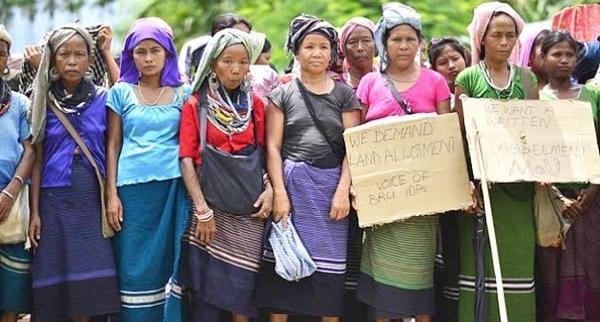Mizoram Brus: The Reluctant Returnees
December 16, 2019 | Expert Insights

Background
The Brus or the Reang is a community indigenous to North East India, living mostly in Tripura, Mizoram and Assam. In 1997, following an ethnic clash with the majority Mizo tribe, the Brus were compelled to leave their homes in various districts of Mizoram and settle in seven refugee camps spread across Tripura’s Jampui Hills. The main contention between the two communities arose from the disenfranchisement attempt of Brus, by Mizo Nationalists, who stated that the Brus were not indigenous to Mizoram and must be left out of Mizoram’s state electoral rolls. As a reaction to this, Bru militants allegedly murdered a Mizo forest guard which then led to the exodus. 12 years later in 2009, the death of a Mizo teenager at the hands of Bru Militants, forced the remaining Brus, to also flee the state.
Over the past twenty years, there have been multiple attempts to repatriate the Brus to their homes in Mizoram, with the ninth and final attempt concluding as of November 2019.
Analysis
After eight failed repatriation exercises and despite numerous incentives to return to their home state in Mizoram, the displaced Brus refuse to return to Mizoram.
The primary concern for the Brus is the lack of a safety umbrella. In 2016, the Ministry of Home Affairs gave a deadline for the Brus to return to Mizoram within six months failing which they would be deleted from the voter lists in Mizoram. The government had also offered them a rehabilitation package where it promised to deposit INR 4 Lakh in the account of every repatriated family, along with a sum of 1.5 L housing assistance and INR 5000 per month for a period of two years and free rations for four years. By Indian standards, this was as generous a grant as one could expect.
In 2017, the Bru Displaced People’s Forum filed an application in the Supreme Court stating that it feared that the Union of India and Tripura Government were trying to force them back to Mizoram, without any proper security or a proper plan to rehabilitate them. The Supreme Court subsequently ordered that only those who on their own wished to go back must be asked to return.
The Bru leaders also put forth certain other demands which included a grant of five hectares of land per family and resettlement in the Dampa Tiger Reserve, as they are primarily an agrarian and forest-dwelling community. For security purposes, they wanted cluster villages and the formation of a Bru Autonomous District Council. The government has refused to agree to these demands.
In November 2018, for the first time since their exodus in 1997, the refugees have cast their votes inside Mizoram. However, around 260 Bru refugees were excluded from the bonafide citizenship list.
As of October 1st, 2019, the government supplied rations to the refugee camps in Tripura have been stopped, leading to a severe food shortage. The Tripura state government has, however, intervened and agreed to provide rations till Mar 2020.
After nine repatriation exercises conducted by the state, there have been only 460 families that have returned to Mizoram. The remaining 4158 families are yet to return.
As of this month, the Union Home Minister has announced that there will be no more repatriation exercises and the Brus remaining in Tripura will be now considered citizens of Tripura.
Assessment
- The condition of the Brus has largely escaped the national mainstream media. However, the government need to take measured action to resolve this more than two-decade-old issue as being spread over some sensitive North-Eastern states; it has the potential to create further internal security problems.
- The state government of Mizoram needs to take into consideration the aspirations of several minority Non-Mizo tribes, like the Brus and the Chakmas, while striving to build a prosperous and stable Mizoram. Having suffered a debilitating insurgency for more than two decades, before an exemplary political settlement was achieved, the Mizos are fully aware of the value of peace in their idyllic state. They need to create conducive conditions for the safe return of the Brus and allow them to participate in the growth of the state. The wounds of 1997 and 2009 need to be finally erased.
- Uprooted from their home and hearth for such a long period, the Brus, a forest-dwelling agrarian community, need an adequate repatriation and resettlement package to begin life afresh. Without land, the entire lot will be marginalised and will be unable to fend for themselves as a community.
- It is biding upon the state to ensure the safety of all citizens irrespective of caste, creed or religion and this need to be ensured. This has been enshrined in our constitution as a fundamental right too.
Image Courtesy: The Janambhumi








Comments